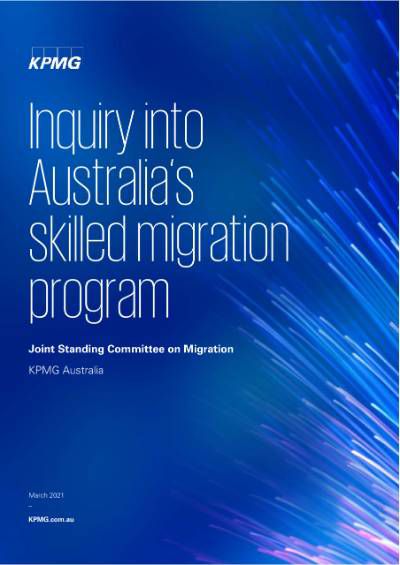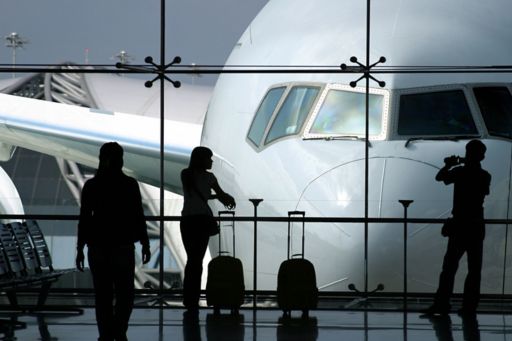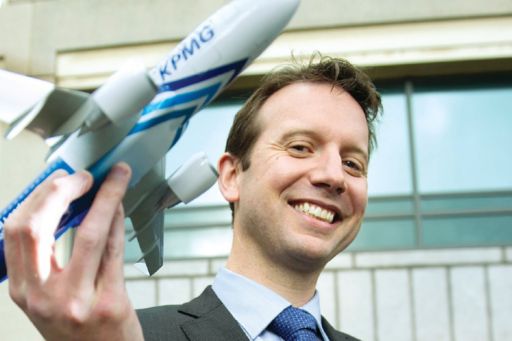As a leading professional services firm, KPMG Australia (KPMG) is committed to meeting the requirements of all our stakeholders – not only the organisations we audit and advise, but also employees, governments, regulators and the wider community. We strive to contribute to the debate that is shaping the Australian economy and welcome the opportunity to provide a submission to the Joint Standing Committee on Migration’s Inquiry into Australia’s Skilled Migration Program (the Inquiry).
Labour shortages due to border closures
Australian businesses are feeling acute labour shortages in areas historically filled by temporary visa holders that have been restricted from entry due to border closures. Shortages have been more pronounced in agriculture, tourism and hospitality sectors, and especially in regional Australia. There have been some temporary schemes to facilitate entry of seasonal and pacific work visa holders, but more could be done, and we would like to see a wider package of concessions be developed to help address the immediate shortfall of workers in regional Australia. This could include the temporary removal of labour market testing for employer sponsored streams, older age limits and lower English language requirements for workers applying for temporary visas or permanent residency in regional areas.
Importance of swift vaccination
Migration issues are currently seen through a COVID-19 prism, and it is in Australia’s and the world’s best interests for an efficient vaccination roll-out to take place as swiftly as possible. In March 2021, KPMG Australia carried out economic modelling which showed that a smooth international roll-out of vaccines this year would boost the Australian economy by $17bn and generate nearly 40,000 jobs, while continued international travel restrictions until the end of 2021, resulting in global services trade remaining depressed and lower Australian GDP of $4bn and 13,100 fewer jobs.
It is essential that Australia works with its counterparts overseas to increase lower income nations’ access to vaccinations. A good step forward in this regard is Australia’s recent commitment to provide one million vaccines to Papua New Guinea. But given the varying experiences of different countries, we believe the Federal Government should commence a review into how Australia could apply a risk-based approach to international travel depending on vaccination status.
Bringing back international students
Longer-term, it is also important that the reduced intake of younger migrants caused by the COVID-19 international travel restrictions is addressed. Previous KPMG Australia economic research, Pathways to recovery: International students will boost our living standards, in August 2020 found that under the ‘vaccine’ and ‘no-vaccine’ scenarios, Australia’s population levels by June 2030 could be between 420,000 and 1,079,000 short of the original ABS projection of 29.12 million. Under the ‘vaccine’ scenario, where borders are restricted to 12 months only, real household disposable income – a better measure of material living standards than GDP – was projected to be more than $31 billion lower than the baseline projection in 2029-30 and on an ongoing basis. In the worst scenario, annual GDP loss to Australia reached $117bn.
We believe it is vital to make Australia more attractive to international students in a post-COVID-19 world, where competition will be even more intense. Just a few years after graduation, students will typically become skilled workers and we should encourage them to stay with a combination of policies that include a stronger link to post-study work rights.
An improved Global Talent Scheme
Aside from COVID-19, we believe improvements to the Global Talent Scheme is needed to ensure international competitiveness in a highly competitive global market, including a review of salary caps, age thresholds, turnover requirements and concessions on key criteria for Hong Kong nationals. While the number of participants in the Global Talent Scheme program has increased three-fold for the 2020-2021 program year to 15,000, the program is still quite restrictive, and we propose a number of amendments in this submission.
Improving processing times for the Global Talent Scheme and the business innovation and investment visa categories so that they are adaptable and responsive to market changes and business requirements would greatly improve take-up. The Global Business and Talent Attraction Taskforce will hopefully go some way in streamlining pathways to permanent residency for exceptionally talented individuals and successful businesses interested in growing their success in Australia. However, the current lengthy processing times, program restrictions and lack of clarity are a disincentive to investors who want to start or acquire an interest in an Australian business.
For Hong Kong nationals, the special visa arrangements provide a longer visa term but do not provide any other concessions to skills and labour market testing criteria for current work visa subclasses. If the government wanted to attract a larger cohort of skilled migrants from Hong Kong, a visa class that provided additional concessions could be effective in attracting skilled professionals. A further increase in program allocation numbers is also recommended in recognition that highly skilled individuals don’t often migrate as sole travellers and will often have accompanying family members who are included in the current program caps.
Contact us
Further reading








